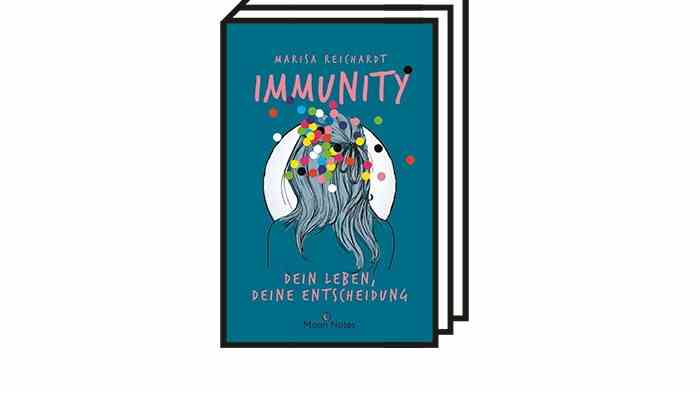If someone has an allergy to bee venom, they are taking a deadly risk with every trip into nature. Is this another danger that a completely unvaccinated person runs when moving in a world where measles and rubella and tetanus await? Marisa Reichardt’s youth novel “Immunity” sometimes deals so considerately with different views that it loses sensuality, but she didn’t make it easy for herself. Narrator Juniper’s problem with her family is presented from two angles, and the difference between taking risks for yourself and harming others is central. But the author does not accept arguments that stand on feet of clay.
What is it like when a child slowly grows up and no longer believes everything their parents say?
First of all, Juniper’s parents are pretty nice people who primarily have the best interests of their children and the planet at heart and just have a different perspective on it than most people. In her world, cola is unhealthy sugar water, cell phones are carcinogenic and the internet is a devil’s stuff that isn’t allowed to cross her threshold. Juniper is not allowed to go to school in the small town in California to which she and her family have just moved. Your school is the kitchen table, homeschooling is what they call it in America. Juniper is sixteen and going to school where she would meet kids her own age that she really wants. But otherwise she is a happy child. Soon it will no longer be about cauliflower instead of pizza, the nice, well-meaning parents are anti-vaccination, and they were already when Juniper was born. She only becomes aware of this when she suddenly becomes seriously ill – the measles, it turns out when she has to go to the hospital. What is she thinking now, while her little siblings will also get sick if she gets polio next? And it gets even worse: at the weekly market where she sells herbs with her mother, she unwittingly infected a newborn baby that died from the measles.
In the United States, Reichardt writes in the appendix to her book, the number of completely unvaccinated children quadrupled between 2001 and 2018 – measles was thought to have been eradicated there before it returned. It was similar in Germany. In 2013, for example, there was an epidemic in Munich, and in 2020 the Measles Protection Act came into force. Since the many school closures, measles has played a rather subordinate role – but it still exists, like many other diseases that can be dangerous for the unvaccinated. In California, where Reichardt’s book is set, the law requires various vaccinations for children to attend public school—Juniper wouldn’t even be allowed to go to high school if her parents let her. Reichardt has chosen a topic that is very up-to-date, not only because of the virus load, but also because it also includes a bit of canceling via Facebook.
What is it like when a child slowly grows up and no longer believes everything their parents say? Juniper learned at the kitchen table that she should question everything – they didn’t expect that she would now find out about the benefits and risks of vaccinations and come to the conclusion that she would turn against her parents if necessary. What she weighs there also has a lot to do with community – she feels responsible for the death of the infant. But Reichardt also tells how the community reacts: They are not just careful when dealing with Juniper’s family, a real hunt begins. Juniper is only going through this because she’s found a boyfriend, Nico, who’s helping her find a lawyer. With that, Juniper’s troubles take on a new dimension: now she is afraid of hurting her erring parents. But then there is no other way. Still prefer a ruined Christmas to a ruined life. Measles are not aspects. How does an anti-vaccination child feel when they grow up? The youth novel “Immunity” – gives a clear answer to this.
Maria Reichardt: Immunity. Translated from the English by Rita Gravert. Moon Notes 2021. 352 pages, 15 euros.

